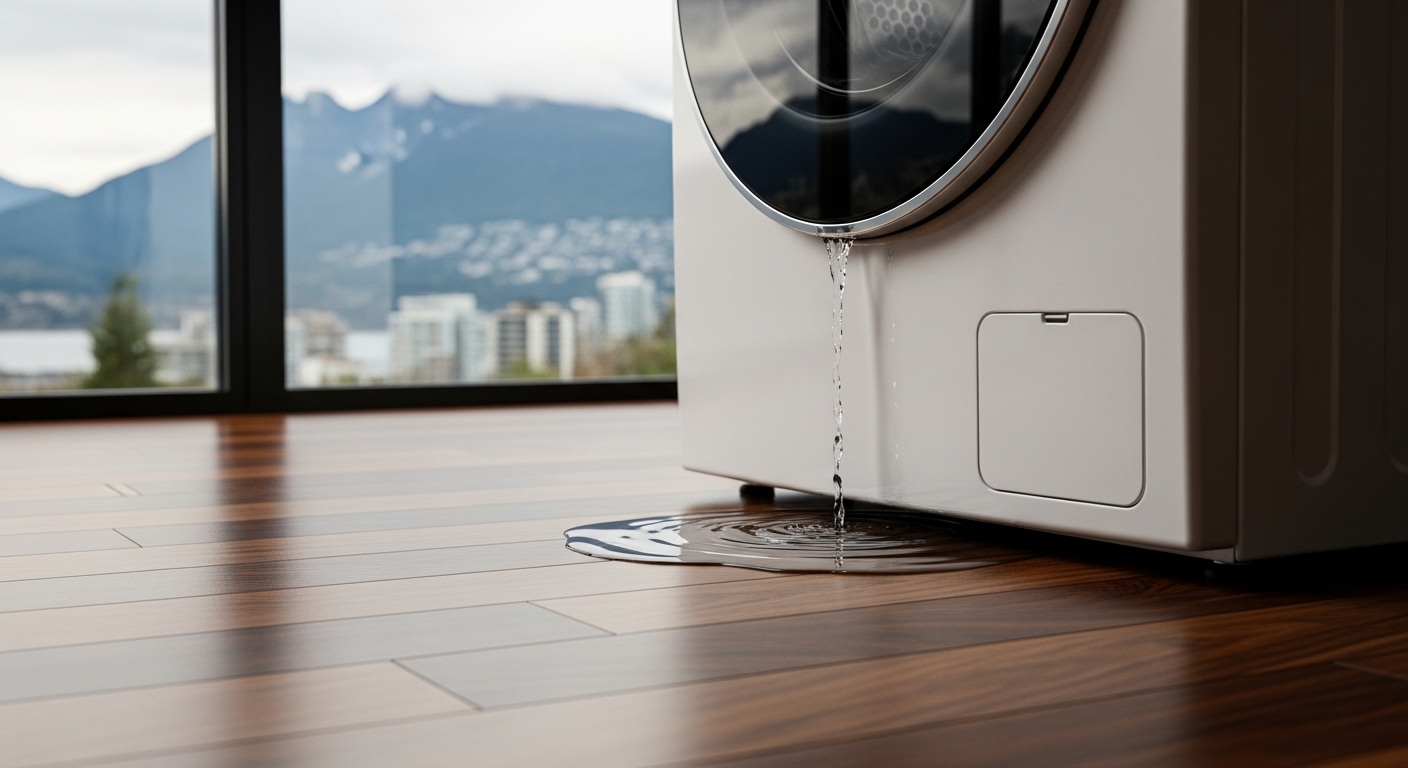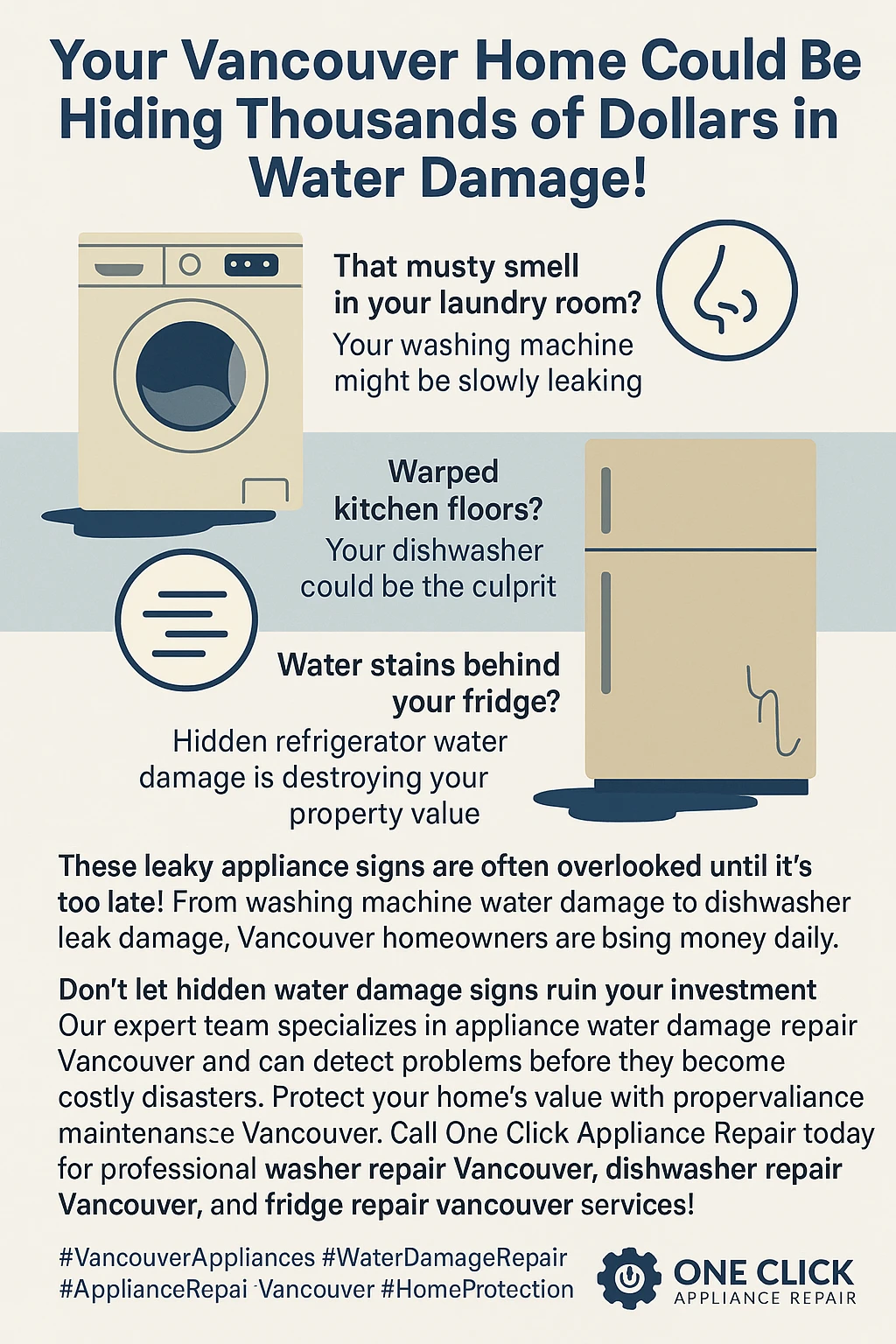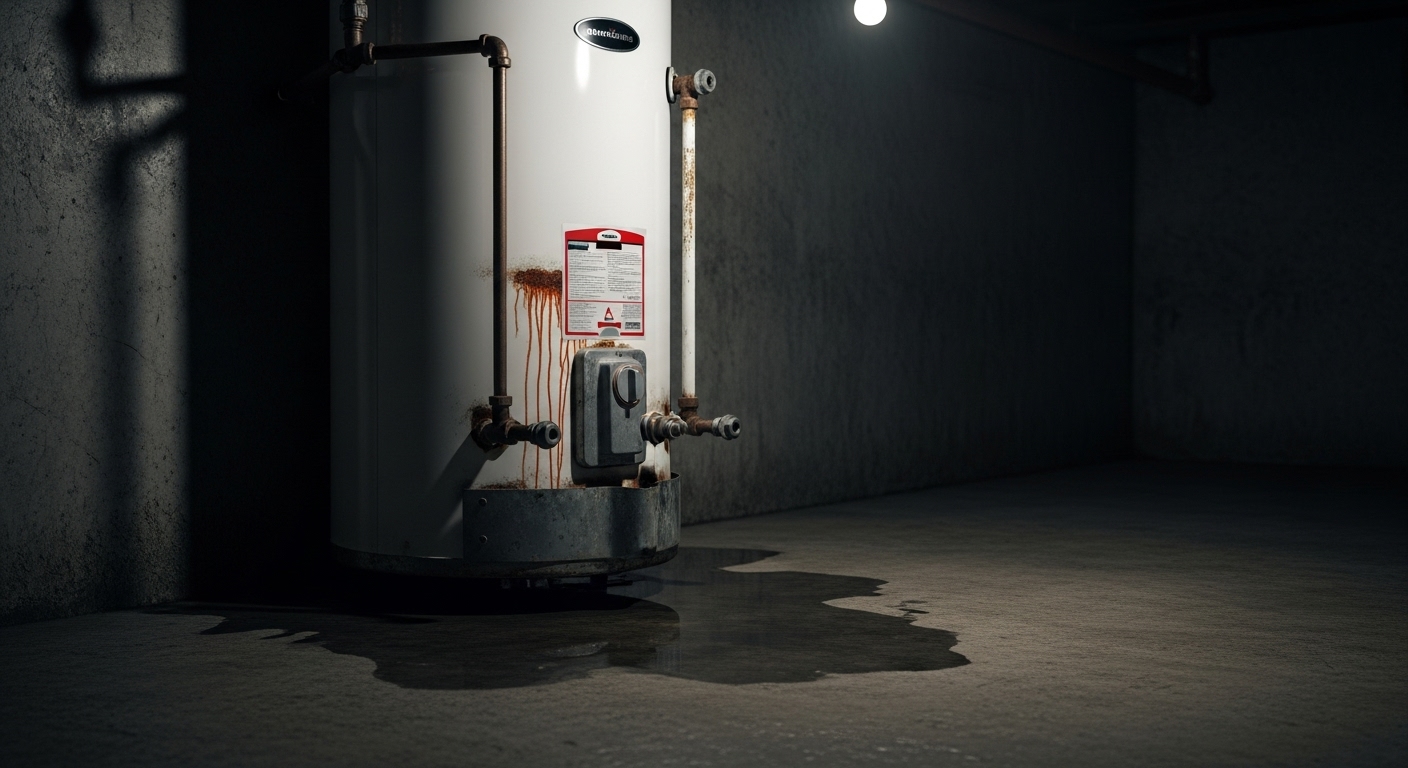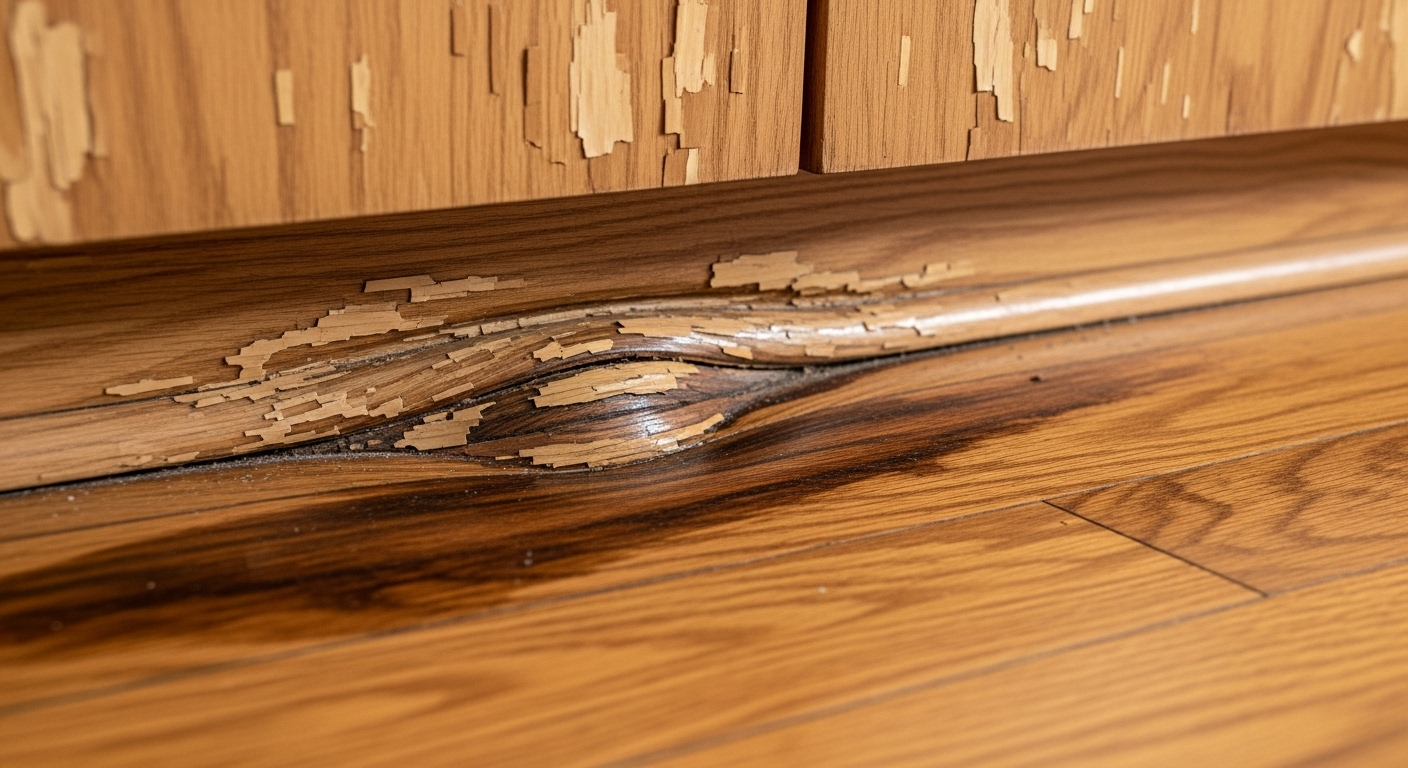Ever wonder why your home insurance premium keeps climbing while your house seems perfectly fine? The silent culprit might be lurking behind your appliances, slowly wreaking havoc on your Vancouver home’s structure and value while you’re none the wiser. Picture this: you’re living your best Vancouver life, commuting downtown for work, enjoying weekend hikes on the North Shore, completely unaware that your 8-year-old washing machine is slowly destroying your hardwood floors. It’s like that friend who seems totally reliable but is secretly spreading gossip behind your back – except this betrayal comes with a price tag that could hit five figures. The reality is that appliance water damage Vancouver homeowners face isn’t just about a puddle on the kitchen floor; it’s about invisible moisture creeping into places you can’t see, causing damage that compounds daily until it becomes a full-blown crisis.  What makes this particularly devastating for Vancouver homeowners is our city’s unique climate challenges. Those constant freeze-thaw cycles we experience? They’re not just making your morning commute treacherous – they’re systematically weakening every seal, gasket, and connection in your appliances. Meanwhile, our infamous West Coast humidity creates the perfect breeding ground for mold and accelerates the corrosion process. It’s like Vancouver’s weather is conspiring against your home’s mechanical systems, and most of us are completely oblivious to the slow-motion disaster unfolding behind our refrigerators and under our washing machines. The statistics are genuinely shocking when you dig into them. We’re talking about 78% of appliance hose failures happening in machines less than 11 years old – that’s not old appliances giving up the ghost, that’s relatively new equipment betraying your trust. Even more terrifying? When these failures happen while you’re at work or away for the weekend, the damage is 2.5 times more severe than when someone’s home to catch it early.
What makes this particularly devastating for Vancouver homeowners is our city’s unique climate challenges. Those constant freeze-thaw cycles we experience? They’re not just making your morning commute treacherous – they’re systematically weakening every seal, gasket, and connection in your appliances. Meanwhile, our infamous West Coast humidity creates the perfect breeding ground for mold and accelerates the corrosion process. It’s like Vancouver’s weather is conspiring against your home’s mechanical systems, and most of us are completely oblivious to the slow-motion disaster unfolding behind our refrigerators and under our washing machines. The statistics are genuinely shocking when you dig into them. We’re talking about 78% of appliance hose failures happening in machines less than 11 years old – that’s not old appliances giving up the ghost, that’s relatively new equipment betraying your trust. Even more terrifying? When these failures happen while you’re at work or away for the weekend, the damage is 2.5 times more severe than when someone’s home to catch it early.
Key Outtakes:
- Appliance water damage is the leading cause of hidden home damage, with 78% of hose failures occurring in appliances less than 11 years old
- Water damage can reduce Vancouver home values by 10-30% and must be disclosed when selling
- Early detection and prevention cost hundreds, while restoration averages $2,000-$15,000+ depending on severity
- Vancouver’s freeze-thaw climate cycles create unique risks that accelerate appliance deterioration
- Smart leak detection systems and regular maintenance can prevent 80% of common appliance water damage

The Hidden Epidemic: Most Common Appliance Water Damage Sources in Vancouver Homes
Let’s get real about what’s probably happening in your home right now. While you’re reading this, there’s a decent chance that at least one of your appliances is in the early stages of failing, and you have absolutely no idea. It’s not your fault – these things are designed to fail quietly, and by the time you notice something’s wrong, the damage has often been happening for weeks or even months.
The absolute worst offender? Your hot water heater. These things are basically ticking time bombs, with 69% of failures happening because of leaks or bursts. Here’s what really gets me fired up about this statistic: after your water heater hits the 12-year mark, there’s a 75% chance it’s going to fail, and when it does, you’re looking at an average of $4,444 in damage. That’s not a typo – over four thousand dollars because a tank you probably never think about decided to give up.
What makes water heaters particularly sneaky in Vancouver homes is that they’re usually tucked away in basements, utility closets, or garages where you rarely venture. The first sign of trouble is often water pooling at the base, but by then, you might already have moisture wicking into your subfloor or drywall. The rust that develops on aging tanks isn’t just cosmetic – it’s a warning sign that the metal is compromising and failure is imminent. 
Your washing machine is another serial offender, and this one really drives me crazy because it feels so preventable. Those rubber hoses connecting your washer to the water supply? They’re basically disaster waiting to happen, with 78% of failures occurring in machines less than 11 years old. The worst part is that 6% of these failures happen when nobody’s home, and the damage ends up being 2.5 times more severe because water just keeps flowing until someone discovers it.
I can’t stress enough how important it is to upgrade to braided stainless steel hoses if you’re still running the original rubber ones. Vancouver’s temperature fluctuations are particularly hard on rubber components – they expand and contract repeatedly, developing micro-cracks that eventually become full-blown ruptures. It’s like doing repeated bicep curls with a rubber band; eventually, that rubber is going to snap.
Dishwashers are the sneaky middle child of appliance water damage. They don’t fail as spectacularly as water heaters or washing machines, but they’re incredibly good at causing slow, insidious damage that you don’t notice until it’s extensive. The door seals wear out gradually, allowing small amounts of water to escape with every wash cycle. Those loose hose connections under the unit drip just enough to keep the area constantly damp, creating perfect conditions for mold growth and wood rot.
What’s particularly frustrating about dishwasher leaks is that they often happen right in the heart of your kitchen, where you have expensive hardwood floors, custom cabinetry, and maybe even that gorgeous kitchen island you spent months saving for. Professional appliance services report that dishwashers over 9 years old face significantly increased failure rates, but the signs are subtle – maybe your dishes aren’t getting as clean, or you notice some unusual sounds during the wash cycle.
Your refrigerator rounds out the top four appliance water damage culprits, and it’s probably the most maddening because you interact with it every single day. The most common issue is defrost drain clogs, where the small drain that removes condensation gets blocked with debris. Water backs up and has nowhere to go except onto your kitchen floor, and because it’s such a small amount at first, you might not even notice until the damage is significant.
Ice makers and water line connections are frequent failure points, especially in Vancouver where our water has enough minerals to cause buildup over time. The water lines running to your refrigerator are often the forgotten stepchildren of your plumbing system – you never think about them until they fail, usually in a spectacular fashion that floods your kitchen while you’re asleep upstairs.
Warning Signs Your Appliances Are Secretly Damaging Your Home
Now that you know which appliances are most likely to betray your trust, let’s talk about becoming a detective in your own home. The key to preventing catastrophic appliance water damage Vancouver homes experience is catching the early warning signs before they become full-blown disasters. Think of it like being in a relationship – there are usually red flags before things completely fall apart, you just need to know what to look for.
The visual warning signs are often subtle at first, which is why so many homeowners miss them until the damage is extensive. Water stains on walls, floors, or cabinets near your appliances are like canaries in coal mines – they’re telling you something is seriously wrong. These stains often start small and grow gradually, so you might dismiss them as normal wear and tear until they become impossible to ignore.
Discoloration, warping, or soft spots in flooring around appliances are red alert territory. I remember visiting a friend’s place where the laminate flooring near her dishwasher had started to buckle slightly. She thought it was just age, but when we pulled up a section, the subfloor underneath was completely soaked and starting to rot. What seemed like minor cosmetic damage was actually thousands of dollars in hidden destruction. 
Peeling or bubbling paint around appliance areas is another dead giveaway that moisture is infiltrating your walls. Paint is surprisingly good at hiding water damage until it reaches a tipping point, then suddenly you’ll see bubbling or peeling that seems to appear overnight. By the time paint starts failing, you usually have significant moisture penetration that requires professional remediation.
Your nose might be your best early warning system for appliance water damage. That persistent musty odor you keep noticing in your laundry room or kitchen isn’t just “old house smell” – it’s likely mold growth from hidden moisture. Mold can begin growing within 24-48 hours of water exposure, so by the time you can smell it, you likely have an established colony.
How Appliance Water Damage Decimates Your Vancouver Home’s Value
Let’s talk brass tacks because this is where the real pain sets in. Appliance water damage isn’t just an inconvenience; it’s a direct assault on your biggest financial asset. In the hyper-competitive Vancouver real estate market, any hint of water damage can be catastrophic for your property value. We’re talking about a potential reduction of 10-30%, which on a multi-million dollar Vancouver home, is a devastating financial hit. You are legally required to disclose any known material latent defects, and significant water damage absolutely falls into that category.
Imagine two identical homes for sale in Kitsilano. One is pristine, the other has a disclosure about previous water damage from a dishwasher leak, even if it’s been “repaired.” Which one do you think is going to sell faster and for a higher price? The stigma of water damage is real, and buyers are terrified of mold issues that might not have been fully remediated. This isn’t just about the cost of repairs; it’s about the long-term perceived value and health of the home.
The repair costs themselves are staggering. What starts as a simple leak can quickly spiral into a five-figure restoration project. The average cost for water damage restoration ranges from $2,000 to $15,000, but in severe cases, it can easily exceed $50,000. Here’s a breakdown of what you’re actually paying for:
- Water Extraction: Getting the bulk of the water out.
- Drying and Dehumidification: Using industrial-grade fans and dehumidifiers to dry out the structure.
- Mold Remediation: If mold is present, this is a specialized and costly process.
- Structural Repairs: Replacing damaged drywall, subflooring, and insulation.
- Cosmetic Repairs: Replacing flooring, cabinetry, and repainting.
What’s infuriating is that a $50 smart leak detector or a $20 set of braided steel hoses could have prevented 80% of these scenarios. It’s the ultimate example of “an ounce of prevention is worth a pound of cure,” except in this case, it’s more like a ton of cure.
FAQs About Appliance Water Damage in Vancouver
- Q: How often should I replace my washing machine hoses? A: A good rule of thumb is every 3 to 5 years. Don’t wait for them to fail. Upgrading to braided stainless steel hoses is one of the smartest, cheapest investments you can make in your home.
- Q: Can I just clean up a small leak myself? A: For a very minor, contained spill, yes. But if water has penetrated flooring or walls, you need professional drying equipment. Household fans won’t be sufficient to prevent mold growth within the structure.
- Q: Are smart leak detectors really worth it? A: Absolutely. For a few hundred dollars, you can get a system that not only alerts your phone to a leak but can also automatically shut off your main water supply, preventing a catastrophe. It’s a no-brainer for any homeowner.
- Q: Does the age of my home affect the risk? A: Yes and no. While older homes may have aging plumbing, the data shows that appliance failure is the main culprit, and it happens in relatively new appliances. A new condo is just as at risk as an older house if the appliances aren’t maintained.
Wrapping Up: Protecting Your Vancouver Home Investment
The threat of appliance water damage in Vancouver isn’t something to be taken lightly. It’s a silent, persistent risk that combines the wear and tear of daily use with the unique environmental pressures of our West Coast climate. The financial and emotional toll of a major water damage event is something no homeowner should have to experience, especially when so many of the causes are preventable.
The solution isn’t to live in fear of your dishwasher or to stop doing laundry. The solution is to be proactive. It’s about spending a Saturday afternoon inspecting your appliance connections, investing in braided steel hoses, and considering a smart water leak detection system. It’s about understanding that the small cost of professional maintenance or a simple upgrade is infinitesimal compared to the thousands of dollars in potential damage and the hit to your home’s value.
Don’t let a $20 rubber hose be the undoing of your six- or seven-figure investment. Take control, be vigilant, and protect your home from the inside out. Your future self—and your bank account—will thank you for it.


